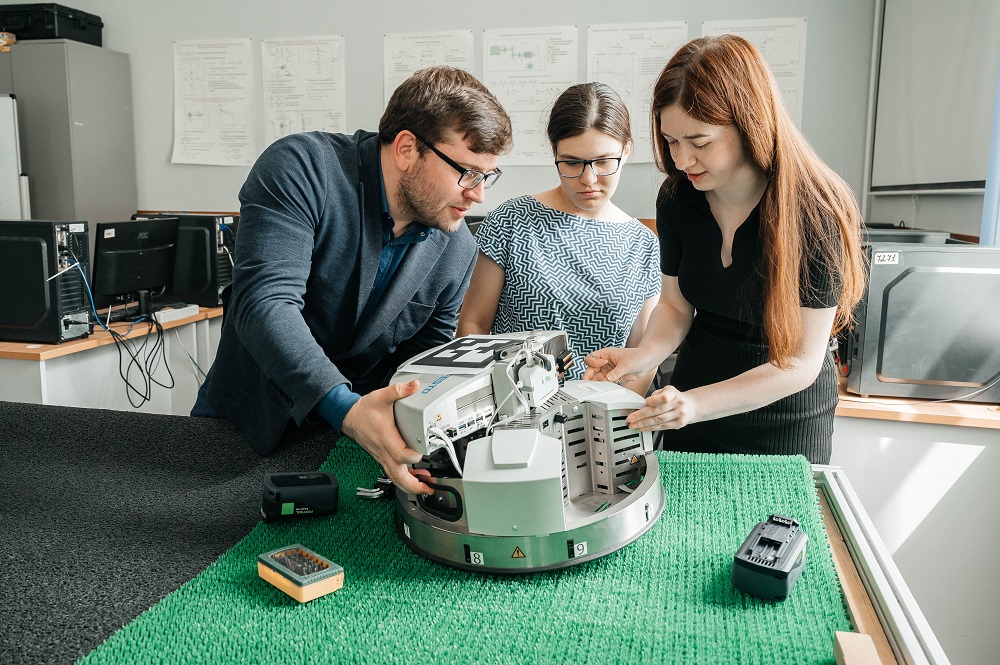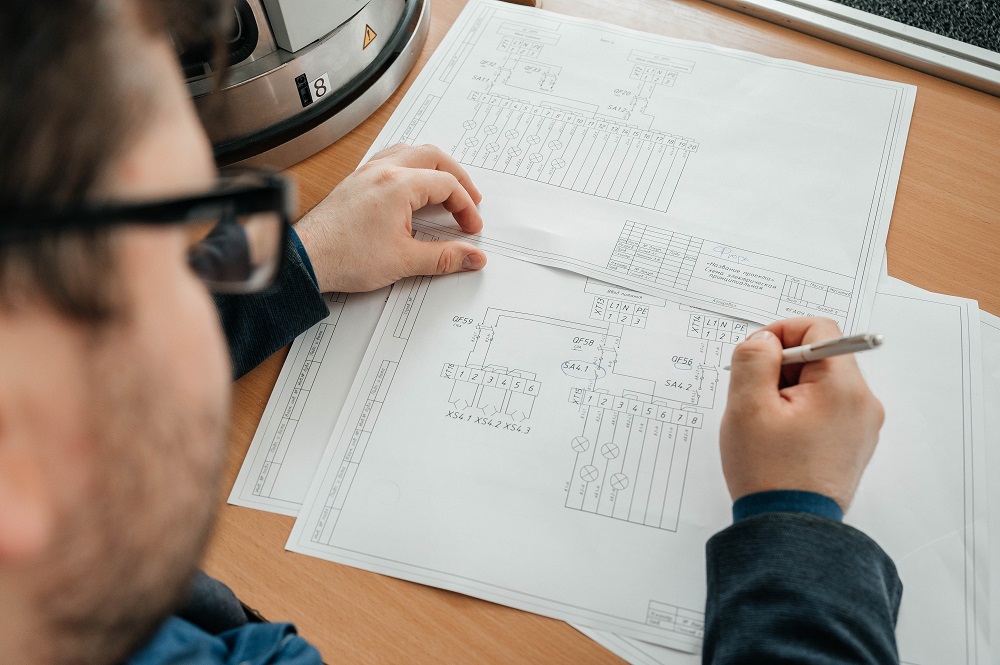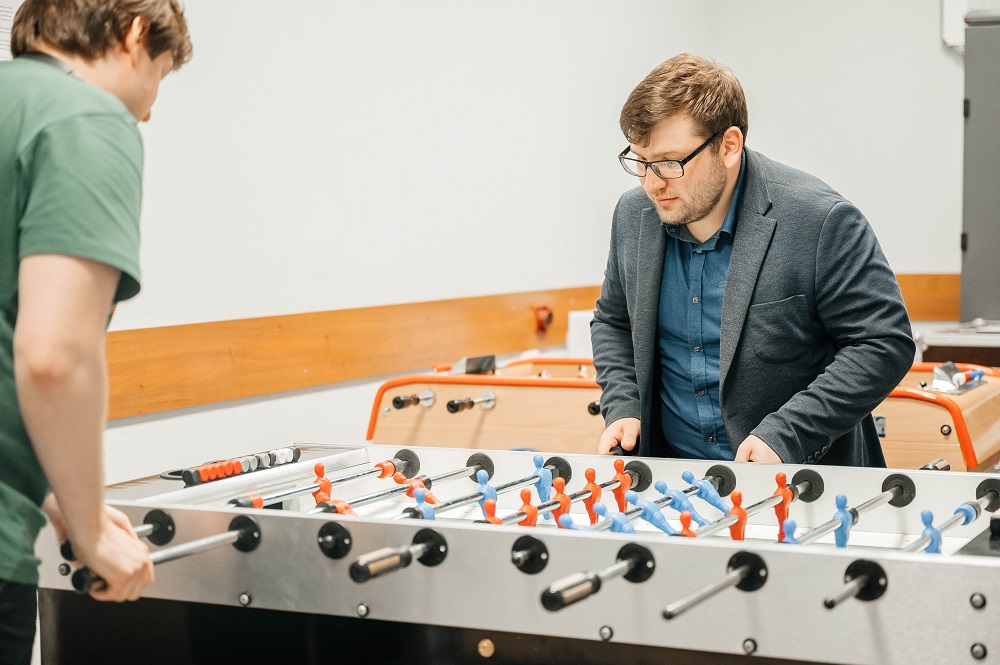NOT DRIVING, BUT WHEELED
Alexander started his teaching career six years ago in his first year of master's program. He teaches courses related to robotics. In lectures, for example, he talks about how to determine spatial position of a robot, sensors, control methods and algorithms. While in the laboratory, he works with students to program real robots so that they move along a predetermined trajectory avoiding obstacles.
Along with classes for students of the School of Computer Science and Robotics, Alexander teaches AI courses for Chinese students pursuing 4+0 and 2+2 double degree programs.I have always had a focus on project-based learning with my students: we program, deal with hardware, write algorithms. I find it much more engaging than regular classes. Robotics is a very broad science in this respect. Within one project, you can try your hand at coding, artificial intelligence, microcontrollers, and control systems. I always try to organize my work so that it would be interesting for all: both for my students and me. Sometimes it works (laughs),

"They say I am a kind teacher, but I do not think I am (laughs). There are always students, who I struggle to get along with, which involves resentments and misunderstandings. I believe I am fair," he says.
To learn the ropes of robots, according to Alexander, you need prior knowledge of physics, mathematics and automated control theory. Also, you should know how to name them correctly: for example, not "driving" robots, but "wheeled" robots.
MINI COMPANY WITHIN THE UNIVERSITY
It seems Alexander and his students can teach robots anything at all. They search for a challenging idea and work on it together. For instance, a group of robots under the tutelage of the developers has already learned to piece together a puzzle of Van Gogh's Starry Night. Now, they are working on two new projects. One of them is a robot control system for natural settings.
"Natural settings are mud, snow, ice, and other outdoor obstacles that can affect the robot's motion. It is important to identify such factors and adjust to them. This is a highly challenging task, because there are no general algorithms to solve this problem, only ad hoc ones. As a case in point, the problem of Yandex delivery robots, which in the winter of 2020 kept getting stuck in the snow and failed to get out without help. We are attempting to work out algorithms that would help a robot to analyze that there is snow underneath and its wheels are slipping, and to figure out how to control them to get itself out of snow," Alexander explains.
The second project is related to the development of de-weighting algorithms. These specialized systems compensate for the weight of an object. They are used, for example, in automatic cranes or patient rehabilitation systems.
Each of these large projects brings together a mixed team of students from different years of study, but all of them are closely connected in fact. We get together every now and then and everyone shares the results of their part of the work. It helps them not only to see what they are doing, but also how their work fits in with the work of others. Such a mini company within the university,
So far, these are only pilot projects. However, the developers are driven to find potential partners and customers. They have already won two UMNIK grants by now.
NATIONAL-LEVEL KICKER TEAM
In his spare time, Alexander is into an exciting and offbeat sport, table soccer also known as kicker. At first kicker was just a leisure activity, but soon after his first competitions it became an integral part of his life.
"This is a very challenging sport that requires an athlete to constantly train and analyze his opponents. I remember my first major tournament in St. Petersburg in 2019. It turned out that I was playing at the level of schoolchildren from central Russia. So, when I came back, I bought myself a professional kicker table. And, of course, I began telling my students about kicker. With only about eight of us gathered together, we started practicing. One day we came up with the idea to set up a kicker table right in the TPU building. We arranged and set it up, and this is when things got rolling: I won a grant and propelled kicker in Tomsk to the national level. Meanwhile, we gathered a team of Tomsk Polytechnic University and began taking part in competitions. At the final stage of the Russian Cup, we were among the winners," recounts the young teacher.
Now, kicker tournaments in Tomsk are comparable to the level of Moscow and St. Petersburg, and TPU today has brought together about 50 players. In 2023, Alexander Belyaev was elected president of the Sports Kicker Federation.
Robotics is similar to playing kicker: both require a lot of thought and analysis. Unfortunately, we have not managed so far to integrate kicker into university sports. This is my short-term goal,
Now, there are two professional kicker tables in the TPU academic building No 10. They are available for any student who wants to play and practice. And if the "coach" spots that someone has a knack for kicker, there is every chance to get into the university team and take part in city competitions.
STUDENT SUCCESS IS THE MAIN MOTIVATIONAlexander shares that his main motivation is the success of his students. In the fall, for example, his students won a Rosneft Robotics Hackathon.
"I enjoy being able to do something new every day. Today I impart professional knowledge to students, and tomorrow I am already plunged into new algorithms and research. The major advantage is that I can choose my own research path. At the same time, I want to grow as a teacher making my classes engaging, speaking about latest trends, showing students by my example that nothing is impossible," adds Alexander.
